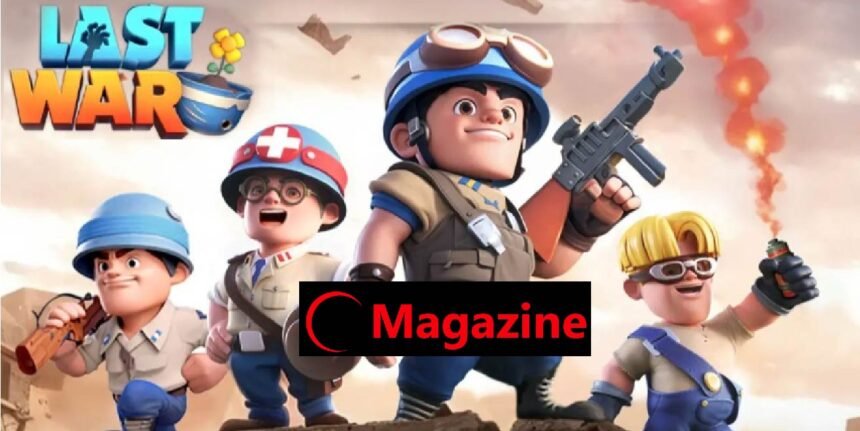Walking through the ruins of civilization, dodging zombie hordes while managing dwindling supplies – Last War: Survival throws you headfirst into humanity’s darkest hour. But scratch beneath the surface, and you’ll discover this isn’t your typical apocalypse simulator. It’s a masterclass in human behavior, decision-making, and community survival.
Beyond the Zombie Apocalypse Cliché
Most zombie games follow a predictable pattern. You grab weapons, shoot everything that moves, and collect loot until the next wave arrives. Last War: Survival deliberately breaks this mold by asking harder questions: How do you rebuild when everything crumbles? Who do you trust when society collapses? What sacrifices are you willing to make for survival?
The game starts simple enough – you’ve got a small outpost and a handful of survivors. But within hours, you’re wrestling with complex decisions that have no clear right answers. Do you risk sending scouts into dangerous territory for better resources? Should you accept refugees when food is already scarce? These moral dilemmas drive the gameplay forward in ways that pure action never could.
The zombie threat serves as a constant pressure valve, forcing quick thinking and rapid adaptation. Unlike other survival games where enemies follow predictable patterns, Last War: Survival’s undead behave unpredictably. Sometimes they swarm in massive waves. Other times, they trickle in just enough to disrupt your carefully laid plans. This uncertainty keeps every session feeling fresh and challenging.
The Psychology of Scarcity
Scarcity defines every aspect of Last War, and it’s this limitation that creates the game’s most compelling moments. When every bullet counts and every piece of food matters, mundane decisions become life-or-death choices. The psychological impact of playing under constant resource pressure changes how you think about priority setting and risk management.
Unlike games that shower you with resources, Last War makes you earn every advantage. Building materials don’t magically appear – they must be scavenged from dangerous locations or traded with other players. Food spoils if not properly stored. Weapons break down without maintenance. This realistic approach to resource management creates authentic tension that keeps you invested in every outcome.
The game’s economy reflects post-apocalyptic reality. Traditional money becomes worthless. Instead, value shifts to practical items: ammunition, medicine, preserved food, and construction materials. Players quickly learn that hoarding isn’t always smart – sometimes trading away valuable resources for immediate needs is the difference between survival and extinction.
Community Dynamics in Crisis
Last War excels at demonstrating how crisis situations reveal true character. The alliance system isn’t just about combining military strength – it’s about testing whether people can maintain cooperation when everything falls apart. Some alliances thrive under pressure, growing stronger through shared hardship. Others crumble at the first sign of disagreement.
The game creates scenarios where individual success conflicts with group welfare. Maybe your alliance needs construction materials for a shared defense project, but using them for your own base upgrades would provide immediate personal benefits. These ethical tensions mirror real-world community challenges and often lead to surprising revelations about your own values.
Trust becomes a precious commodity that must be earned and carefully maintained. Players who break agreements or abandon allies during tough times quickly develop reputations that follow them throughout the game. Conversely, those who consistently support their communities often find themselves with more opportunities and stronger networks.
Strategic Depth vs Instant Gratification
Modern mobile games often prioritize quick rewards over meaningful progression. Last War takes the opposite approach, rewarding patience and long-term thinking. Building a sustainable base takes weeks of careful planning and resource accumulation. Developing effective heroes requires consistent investment over time. Creating lasting alliances demands ongoing communication and mutual support.
This slower pace initially frustrates players accustomed to instant gratification. But those who stick with the game discover that delayed rewards feel more satisfying than quick fixes. Successfully defending your base after weeks of preparation provides a sense of accomplishment that momentary victories can’t match.
The Last War store recognizes different player preferences by offering both immediate boosts and long-term investments. Some items provide instant advantages for urgent situations, while others enhance your progression rate over extended periods. Smart players learn to balance these options based on their current needs and future goals.

Innovation Through Limitations
Constraints often spark creativity, and Last War proves this principle repeatedly. When you can’t simply overpower problems with superior force, you must find clever solutions. Maybe you can’t afford a direct assault on that zombie nest, but you can lure them away with noise distractions. Perhaps you lack the resources for advanced defenses, but strategic chokepoints and terrain advantages can level the playing field.
The game’s dual-mode structure – base management combined with real-time action – forces players to think on multiple timescales simultaneously. Your long-term base development plans must account for immediate threats. Your short-term tactical decisions impact future strategic options. This multi-layered thinking develops cognitive flexibility that extends beyond gaming.
Equipment and hero limitations create interesting puzzle-solving opportunities. With limited slots for active heroes and restricted gear options, team composition becomes a strategic art form. Players experiment with unconventional combinations, discovering synergies that transform their effectiveness in unexpected ways.
Seasonal Adaptation and Change
Last War’s seasonal system prevents strategic stagnation by regularly introducing new variables that force adaptation. Environmental challenges like extreme weather, resource shortages, or increased zombie activity require players to modify their approaches. Strategies that worked perfectly last season might become completely ineffective under new conditions.
These changes mirror real-world challenges where external factors beyond our control force us to adapt or fail. Learning to pivot quickly when circumstances change, identifying new opportunities within constraints, and maintaining effectiveness despite disruption are valuable skills that translate well beyond gaming contexts.
The seasonal structure also creates natural break points for reflection and planning. Between seasons, experienced players analyze what worked, what failed, and how they can improve their approach for future challenges. This metacognitive aspect – thinking about thinking – enhances the learning value of the gaming experience.
Economic Strategy and Resource Investment
Understanding Last War’s economy requires thinking beyond traditional gaming metrics. Success isn’t just about accumulating the most resources – it’s about deploying them effectively at optimal times. Sometimes holding onto resources is smart. Other times, immediate investment provides compound returns that justify the risk.
The game top up system adds another layer of economic decision-making. Premium purchases can accelerate progress or provide access to exclusive content, but they work best when integrated with sound strategic planning. Players who understand the underlying game mechanics make more effective use of purchased advantages than those who rely solely on premium items.
Resource trading between players creates a dynamic marketplace where supply and demand fluctuate based on seasonal challenges, alliance conflicts, and individual player needs. Successful traders learn to anticipate these market shifts, positioning themselves to profit from predictable patterns while adapting to unexpected disruptions.
Personal Growth Through Virtual Challenges
Playing Last War seriously requires developing several key competencies: strategic thinking, risk assessment, team collaboration, and crisis management. These skills improve through repeated practice in high-stakes scenarios where mistakes have meaningful consequences. The game provides a safe environment for experimenting with leadership styles and decision-making approaches.
The hero development system serves as a metaphor for personal growth. Heroes don’t just level up automatically – they improve through experience, training, and strategic deployment. Players must identify each hero’s strengths, understand their limitations, and create opportunities for them to excel. This process mirrors how we develop our own capabilities in real-world situations.
Failure in Last War carries genuine sting because of the time and effort invested in building your community. But these setbacks also provide valuable learning opportunities. Understanding why a particular strategy failed, recognizing early warning signs of problems, and developing contingency plans for future challenges are skills that serve you well in all areas of life.
The Social Laboratory Effect
Last War functions as a social experiment where players test different approaches to cooperation, leadership, and conflict resolution. The game’s structure creates situations that reveal character traits and decision-making patterns that might not emerge in less stressful environments.
Some players emerge as natural leaders, organizing alliance activities and mediating disputes. Others excel as specialists, contributing unique expertise that benefits the entire community. Still others prefer supportive roles, providing reliable assistance without seeking recognition. The game accommodates these different personality types while demonstrating how diverse teams often outperform homogeneous groups.
The competitive elements add intensity to social dynamics without making conflict inevitable. Smart players recognize that cooperation often produces better outcomes than pure competition, but they also understand when competitive advantages are necessary for survival.
Long-Term Engagement and Mastery
Last War sustains interest over extended periods by offering multiple paths to mastery. Base building enthusiasts can optimize layouts and upgrade strategies. Combat specialists can perfect their tactical approaches and hero combinations. Social players can focus on alliance leadership and community building. Economic players can master the trading systems and resource management.
This variety means that different players can find their niche while still contributing to shared objectives. The game doesn’t force everyone into the same mold – it recognizes that communities thrive when individuals contribute their unique strengths toward common goals.
The learning curve remains challenging even for experienced players because new seasons introduce fresh variables and the social dynamics continue evolving. Mastery becomes an ongoing process rather than a fixed destination, keeping the experience engaging for months or years of play.
Why Last War Resonates Now
In an era of global uncertainty, climate change, and social division, Last War’s themes feel surprisingly relevant. The game explores questions about community resilience, resource sustainability, and cooperation under pressure that mirror contemporary challenges. Playing through these scenarios, even in a fictional context, can provide insights and perspectives that inform real-world decisions.
The game’s emphasis on long-term thinking and collective action offers a refreshing alternative to short-term, individualistic approaches that dominate many aspects of modern life. Through gameplay, players experience firsthand how community cooperation and strategic planning can overcome challenges that would defeat isolated individuals.







